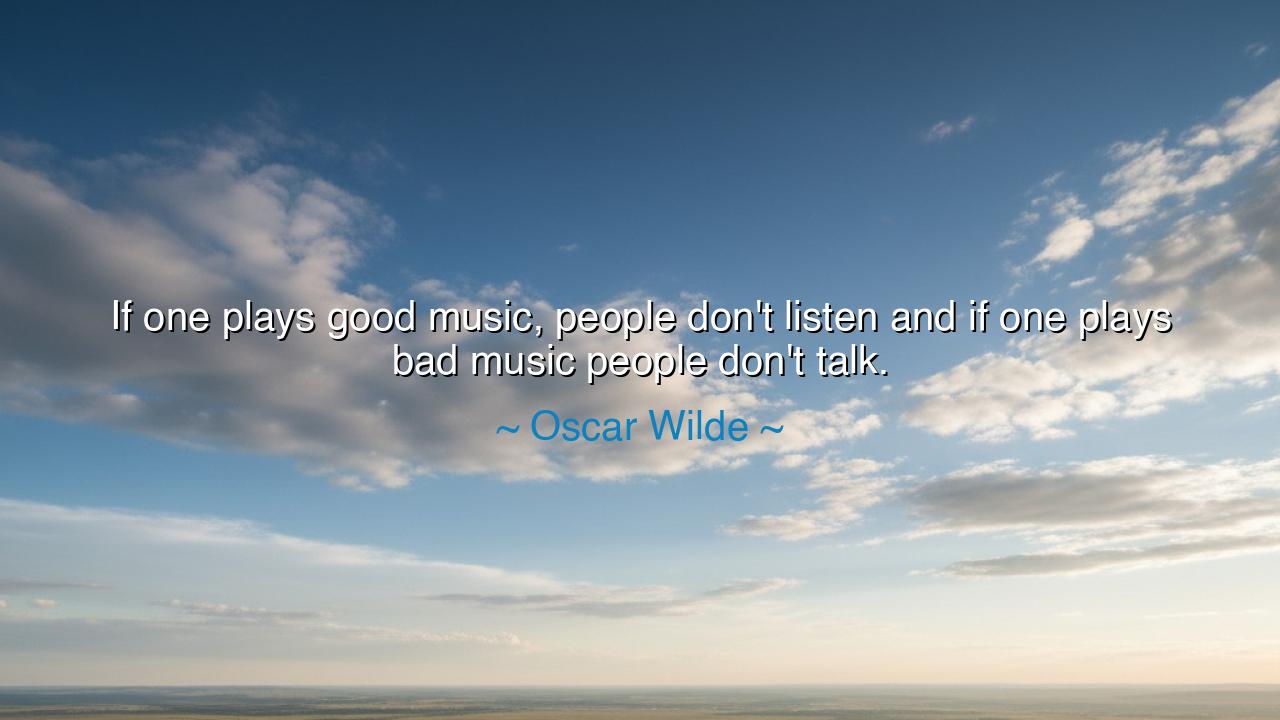
If one plays good music, people don't listen and if one plays
If one plays good music, people don't listen and if one plays bad music people don't talk.






Hear, O seeker of wisdom, the playful yet piercing words of Oscar Wilde: “If one plays good music, people don’t listen and if one plays bad music people don’t talk.” At first, these words may appear as jest, a clever quip from a master of wit. But beneath their laughter lies an ancient truth about human nature, about art, and about the way we receive beauty and imperfection. Wilde, ever the keen observer of society, saw that the soul often responds in paradox: that greatness may be overlooked, while mediocrity commands attention.
The first lesson lies in the phrase: “If one plays good music, people don’t listen.” Why is it so? Because true beauty often humbles the spirit into silence. When music is good—when it is art that transcends the ordinary—men and women cease their chatter. They do not analyze, they do not debate; they are carried away. They no longer listen with the ears but with the heart. Thus, it seems as if they do not “listen” at all, but rather dissolve into the music’s spell. True art does not beg for attention—it demands surrender.
And yet, the second half reveals the irony: “If one plays bad music, people don’t talk.” Here, silence arises not from awe, but from discomfort. Poor music, like any poor art, weighs on the spirit. It compels the audience to hush, not in reverence, but in self-defense, for fear that words would draw greater attention to the suffering of the moment. Thus silence has two faces: one born of wonder, the other born of unease. Wilde, with his mischievous wisdom, points us toward this paradox, so that we may reflect on the subtleties of human response.
History offers us examples. Recall the premiere of Stravinsky’s Rite of Spring in 1913 Paris. The music, so new, so jarring, so unlike the sweet symphonies of old, caused an uproar. The crowd erupted—some jeering, some cheering, many silenced in confusion. Was this silence of awe or of rejection? At first, it was the silence of discomfort, the hush before protest. But in time, the same work was hailed as a masterpiece, and audiences fell silent again—this time in reverence. Thus, Wilde’s words reveal not just a joke, but the strange duality of art’s reception: both bad and brilliant music may halt our tongues, though for very different reasons.
What lesson can the seeker draw? That human judgment is fickle, and that the worth of art—or of any creation—cannot be measured only by the noise or silence of the crowd. Sometimes your finest work will go unpraised, absorbed so deeply that words cannot follow. At other times, mistakes will draw more attention than triumphs. The wise soul does not live for applause or for chatter but creates from a deeper source: love of the craft itself.
Therefore, the practical path is this: pursue excellence without attachment to recognition. If you play your music—literal or metaphorical—with honesty and devotion, trust that it will find its mark, even if unseen. If your work is met with silence, do not despair—it may be the silence of awe. And if it is the silence of discomfort, learn and refine, but do not let the voices of the crowd govern the fire of your art. For the crowd is ever-changing, but truth endures.
Take these words as a shield: the value of your creation is not determined by noise or silence, but by the purity of its intent and the power of its execution. Let Wilde’s wit remind you that appearances deceive, and that art—whether in music, work, or life—is measured not by immediate response but by the echoes it leaves in time.
Thus, remember the paradox and carry it with you: “If one plays good music, people don’t listen and if one plays bad music people don’t talk.” Let it remind you that silence may conceal both reverence and rejection, and that your task is not to please the moment but to remain faithful to the song you were born to play.






AAdministratorAdministrator
Welcome, honored guests. Please leave a comment, we will respond soon